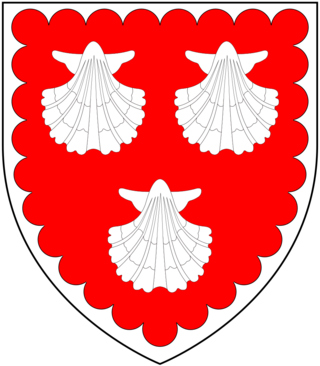Related Research Articles

James FitzJames Butler, 2nd Duke of Ormonde, (1665–1745) was an Irish statesman and soldier. He was the third of the Kilcash branch of the family to inherit the earldom of Ormond. Like his grandfather, the 1st Duke, he was raised as a Protestant, unlike his extended family who held to Roman Catholicism. He served in the campaign to put down the Monmouth Rebellion, in the Williamite War in Ireland, in the Nine Years' War and in the War of the Spanish Succession but was accused of treason and went into exile after the Jacobite rising of 1715.

Sir John Houblon was an English merchant and banker who served as the first governor of the Bank of England from 1694 to 1697. He also served as the Lord Mayor of London in 1695.
Ardfert was a constituency represented in the House of Commons of the Parliament of Ireland until the Act of Union 1800.

General Thomas Erle PC of Charborough, Dorset, was a general in the English Army and, thereafter, the British Army. He was also a Whig politician who sat in the House of Commons of England and of Great Britain from 1678 to 1718. He was Governor of Portsmouth and a Lieutenant-General of the Ordnance.

Samuel Molyneux FRS was an amateur astronomer and politician who sat in the British House of Commons between 1715 and 1728 and in the Irish House of Commons from 1727 to 1728. His work with James Bradley attempting to measure stellar parallax led to the discovery of the aberration of light. The aberration was the first definite evidence that the earth moved and that Copernicus and Kepler were correct. In addition to his astronomical works, Molyneux wrote about the natural history and other features of Ireland. He died in suspicious circumstances.

Almeric de Courcy, 23rd Baron Kingsale (1664–1720) was an Irish Jacobite.
The High Sheriff of Kerry was the British Crown's judicial representative in County Kerry, Ireland from the 16th century until 1922, when the office was abolished in the new Free State and replaced by the office of Kerry County Sheriff. The sheriff had judicial, electoral, ceremonial and administrative functions and executed High Court Writs. In 1908, an Order in Council made the Lord-Lieutenant the Sovereign's prime representative in a county and reduced the High Sheriff's precedence. However, the sheriff retained his responsibilities for the preservation of law and order in the county. The usual procedure for appointing the sheriff from 1660 onwards was that three persons were nominated at the beginning of each year from the county and the Lord Lieutenant then appointed his choice as High Sheriff for the remainder of the year. Often the other nominees were appointed as under-sheriffs. Sometimes a sheriff did not fulfil his entire term through death or other event and another sheriff was then appointed for the remainder of the year. The dates given hereunder are the dates of appointment. All addresses are in County Kerry unless stated otherwise.
Philip Og O'Reilly was an MP for Cavan in the Parliament of Ireland of 1689.

Simon Digby was an Irish Anglican bishop at the end of the seventeenth century and the beginning of the eighteenth century. He was the son of Essex Digby and attended Trinity College Dublin. After a short spell as Dean of Kildare in 1678–1679, he was nominated Bishop of Limerick, Ardfert and Aghadoe on 24 January 1679 and consecrated on 23 March that year. He was summoned to attend the short-lived Patriot Parliament called by James II of England in 1689. In 1690 he was translated to Elphin, being nominated on 4 December and appointed by letters patent on 12 January the following year. He died in office on 7 April 1720.
John Vesey was a Church of Ireland clergyman.
Sir Thomas Crosbie, also recorded as Crosby, was an Anglo-Irish soldier and politician.

Ballyheigue Castle, in Ballyheigue, County Kerry, is a ruined Tudor-gothic-revival-style mansion. It was used as a residence of the Crosbie family and later as a gaol. It has been burned twice. It is currently part of a golf course.
Sir John Fitzgerald, 2nd Baronet was an Irish Jacobite politician and soldier.
Matthew Plunkett, 7th Baron Louth was an Irish Jacobite soldier and peer.
Sir Gregory Byrne, 1st Baronet was an Irish Jacobite soldier and politician.
Sir Terence MacDermott was an Irish merchant and Jacobite politician.
Colonel Roger McElligott was an Irish Jacobite soldier and politician.
Colonel Dudley Bagenal or Bagnall was an Irish soldier, Jacobite politician and courtier.
Colonel Charles MacCarthy was an Irish Jacobite politician.
Francis Plowden was an English Jacobite politician, official and courtier who rose to prominence while serving James II of England in Ireland.
References
- ↑ O'Hart, John, The Irish Parliament of King James the Second in 1689, Irish Pedigrees: or the Origin and Stem of the Irish Nation (5th Ed., 1892), Volume 2. Retrieved 21 February 2023.
- ↑ Brady, W. Maziere (October 1915). "The MacGillycuddy Family". Kerry Archaeological Magazine. 3 (15): 182. Retrieved 21 February 2023.